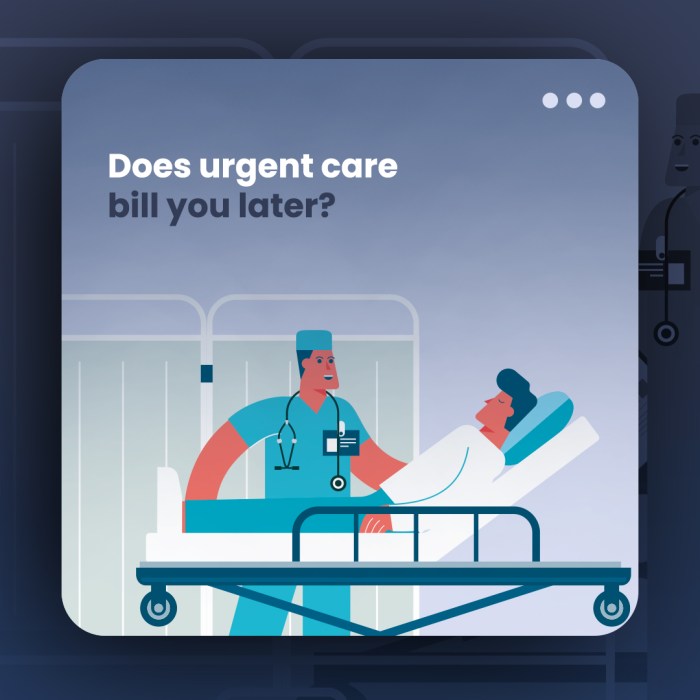Does urgent care bill you later with insurance? The answer is not always straightforward. In this comprehensive guide, we’ll delve into the billing practices of urgent care facilities when insurance is involved, exploring co-pays, deductibles, timelines, and more. We’ll also discuss insurance coverage limitations and exclusions, communication transparency, payment options, and your rights as a patient. By the end, you’ll have a clear understanding of the urgent care billing process and how insurance impacts your financial responsibility.
Billing Practices of Urgent Care with Insurance
Urgent care clinics typically bill patients after insurance has processed the claim. The billing process involves several steps:
1. The patient receives care at the urgent care clinic and provides their insurance information.
2. The clinic submits a claim to the insurance company, which includes details of the services provided and the charges.
3. The insurance company reviews the claim and determines the patient’s financial responsibility, which may include a co-pay, deductible, and coinsurance.
If you’re wondering whether urgent care bills you later with insurance, it’s crucial to consider your coverage options. For instance, senior care insurance may cover urgent care expenses. While insurance can typically reduce out-of-pocket costs, it’s essential to check your specific policy to determine whether urgent care is covered and if there are any limitations or deductibles.
4. The clinic sends a bill to the patient for the remaining balance after insurance has paid its portion.
Urgent care centers typically bill you later, even with insurance. If you’re looking for more information on life insurance, you may want to consider open care life insurance reviews. They offer a variety of policies that can help you protect your loved ones in the event of your death.
Urgent care centers can be a convenient option for getting medical care without having to wait for an appointment.
Co-pays, Deductibles, and Coinsurance, Does urgent care bill you later with insurance
* Co-pay: A fixed amount that the patient pays at the time of service, regardless of the total cost of the visit.
* Deductible: The amount that the patient must pay out-of-pocket before insurance begins to cover costs.
* Coinsurance: A percentage of the remaining balance that the patient is responsible for after the deductible has been met.
Timelines for Billing and Payment Expectations
The timeline for billing and payment expectations can vary depending on the urgent care clinic and the insurance company. Generally, patients can expect to receive a bill within a few weeks of their visit. Payment is typically due within 30 days of the billing date.
Understanding Insurance Coverage for Urgent Care

Urgent care visits are often covered by insurance, but it’s essential to understand the specific terms of your plan to avoid unexpected costs.
While urgent care facilities typically bill patients upfront, they may offer payment plans or work with open care insurance providers to cover costs. Open care insurance allows individuals to access healthcare services without traditional insurance policies, making it a viable option for those seeking affordable urgent care treatment.
Most health insurance plans cover urgent care visits, including those provided by independent urgent care centers and those affiliated with hospitals. However, there may be some limitations or exclusions to coverage, such as:
Types of Insurance Plans
- Commercial insurance: Most commercial insurance plans cover urgent care visits, but there may be some limitations or exclusions. It’s essential to check with your insurance provider to verify your coverage.
- Medicare: Medicare Part B covers urgent care visits, but there may be some limitations or exclusions. For example, Medicare may not cover urgent care visits that are considered routine or preventive care.
- Medicaid: Medicaid covers urgent care visits, but there may be some limitations or exclusions. For example, Medicaid may not cover urgent care visits that are considered routine or preventive care.
Coverage Limitations and Exclusions
Some common limitations or exclusions to urgent care coverage include:
- Copayments: You may be required to pay a copayment for an urgent care visit. The copayment amount will vary depending on your insurance plan.
- Deductibles: You may have to meet your deductible before your insurance will start to cover urgent care visits. The deductible amount will vary depending on your insurance plan.
- Out-of-network providers: If you visit an urgent care center that is not in your insurance network, you may be responsible for paying the full cost of the visit.
Verifying Insurance Coverage
Before receiving urgent care services, it’s essential to verify your insurance coverage. You can do this by contacting your insurance provider or visiting their website.
If you’re wondering whether urgent care bills you later with insurance, the answer is generally yes. However, if you’ve been involved in a car accident without insurance and are not at fault, you may be able to negotiate with the urgent care facility to reduce or waive your bill.
When verifying your coverage, be sure to ask about the following:
- Does my plan cover urgent care visits?
- Are there any limitations or exclusions to coverage?
- How much will I be responsible for paying?
Communication and Billing Transparency: Does Urgent Care Bill You Later With Insurance

Urgent care providers have a responsibility to communicate clearly with patients regarding billing practices. This includes explaining the charges for services, payment options, and insurance coverage. Patients should be provided with a detailed billing statement that Artikels the services provided, the charges for each service, and the total amount due. They should also be able to access their billing information online or through a mobile app.
Resolving Billing Disputes or Inquiries
If a patient has any questions or concerns about their bill, they should contact the urgent care provider’s billing department. The billing department can help resolve any billing disputes or inquiries and provide patients with additional information about their bill.
Urgent care centers typically bill patients later, even with insurance. The amount you owe will depend on your insurance coverage and the services you received. If you’re looking for affordable car insurance in Greensboro, NC , be sure to compare quotes from multiple providers to find the best deal.
Urgent care centers can be a convenient and affordable option for minor medical emergencies, but it’s important to understand your insurance coverage before you go.
Payment Options and Financial Assistance
Urgent care clinics offer various payment options to accommodate patients’ financial needs. These may include:
* Cash
* Credit cards
* Debit cards
* Health savings accounts (HSAs)
* Flexible spending accounts (FSAs)
For patients who are unable to pay their bill in full upfront, many urgent care clinics offer financial assistance programs or payment plans. These programs typically require patients to provide proof of income and hardship.
Applying for Financial Assistance or Payment Plans
The process for applying for financial assistance or a payment plan varies depending on the urgent care clinic. In general, patients will need to:
* Contact the clinic’s billing department
* Provide proof of income and hardship
* Complete an application form
Once the application is processed, the clinic will determine if the patient qualifies for financial assistance or a payment plan.
Resources for Patients Who May Need Financial Assistance
There are a number of resources available to patients who may need financial assistance with their urgent care bill. These resources include:
* The Patient Advocate Foundation
* The National Patient Advocate Foundation
* The Healthcare Financial Management Association (HFMA)
These organizations can provide patients with information about financial assistance programs and help them to apply for assistance.
Legal Considerations and Patient Rights

Urgent care billing practices are subject to various legal considerations and patient rights. Understanding these legal implications is crucial for both healthcare providers and patients.
Patient’s Rights Regarding Billing and Payment
Patients have the right to:
- Receive clear and accurate billing statements.
- Be informed of their financial responsibility before receiving services.
- Dispute any billing errors or overcharges.
- Access their medical records, including billing information.
Protecting Patient Rights in Case of Billing Disputes
In case of billing disputes, patients can take the following steps:
- Contact the healthcare provider to discuss the issue.
- File a complaint with the state insurance commissioner or attorney general.
- Seek legal advice from an attorney.
Q&A
Do all urgent care facilities bill patients later with insurance?
No, billing practices may vary depending on the facility and insurance provider. Some urgent care centers may require payment upfront, while others may bill you later.
What is the typical timeline for urgent care billing?
Billing timelines can vary, but generally, you can expect to receive a bill within 30-60 days after your visit.
Can I dispute urgent care bills?
Yes, you have the right to dispute any billing errors or charges that you believe are incorrect. Contact your urgent care provider or insurance company to initiate the dispute process.




